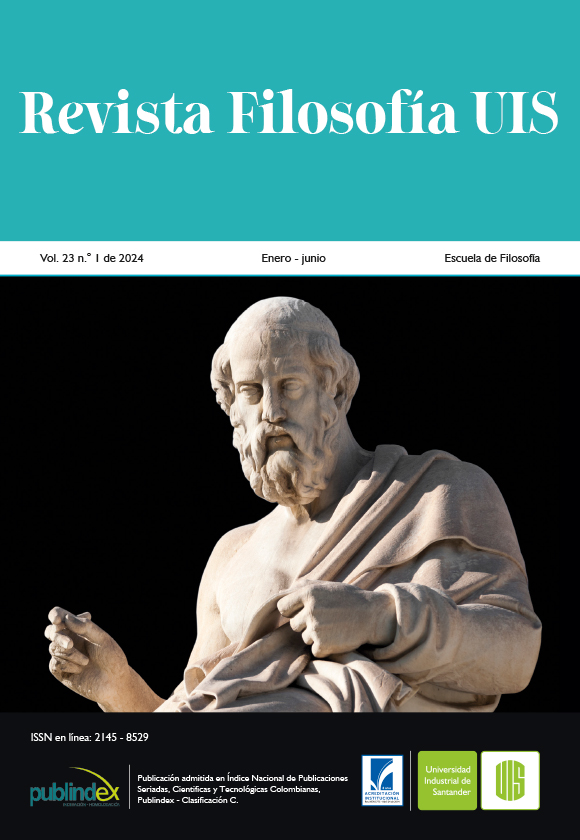Scope and Limits of Peter Singer's Preference Utilitarianism and the Defense of Equal Treatment of Nonhuman Animals
Published 2024-01-02
Keywords
- Preference utilitarianism,
- Peter Singer,
- egalitarianism,
- animals
How to Cite
Copyright (c) 2024 Revista Filosofía UIS

This work is licensed under a Creative Commons Attribution 4.0 International License.
Abstract
This article analyzes Peter Singer's preference utilitarianism theoretical proposal and studies its scope and limitations in relation to advocating for equal treatment towards non-human animals. First, I will present Singer's theoretical model, followed by an analysis of three criticisms: a) the counterargument of replaceable resources; b) the determination of the value of the lives of non-human animals as intrinsic and c) the importance of the treatment of the concept of animal rights. Finally, I will evaluate Singer's proposal based on the criticisms, with the purpose of having a more coherent theoretical proposal that provides a defense for species other than humans. This article contributes to the ongoing discussion on animal ethics and environmental responsibility.
Downloads
References
- Barrientos Llosa, Z. (2003). Zoología General. Editorial EUNED.
- Beauchamp, T. L., & Frey, R. G. (Eds.). (2011). The Oxford handbook of animal ethics. Oxford University Press, USA.
- Bekoff, M., & Jamieson, D. (Eds.). (1996). Readings in animal cognition. Mit Press.
- Bekoff, M. & Meaney, C. (1998). Encyclopedia of Animal Rights and Animal Welfare, Greenwood Press.
- Bentham, J. (2005). An Introduction to the Principles of Moral and Legislation, Oxford University Press. [Traducción: Bentham, J. (2008). Los principios de la moral y la legislación. Editorial Claridad]
- DeGrazia, D. (1994). Wittgenstein and the Mental Life of Animals. History of Philosophy Quarterly, 11(1), 121–137. http://www.jstor.org/stable/27744613
- Descartes, R. (2006). Discurso del método. Tecnos.
- Dupré, J. (1996). The Mental Lives of Nonhuman Animals. En: Readings in Animal Cognition (pp. 323-336). MIT Press.
- Francione, G. L. (1999) “El error de Bentham (y el de Singer)”, en: Teorema, Revista Internacional de Filosofía, Salamanca, Vol. XVIII/3.
- González Herrera, Y. (2023). Igualdad animal para la no-violencia. Revista Filosofía UIS, 22(1), 209–224. https://doi.org/10.18273/revfil.v22n1-2023010
- Hume, D. (1993). Investigación sobre los principios de la moral, Alianza.
- Lazari-Radek, K., & Singer, P. (2014). The Point of View of the Universe. Sidgwick and Contemporary Ethics, Oxford University Press.
- Mill, J. S. (2003). Utilitarism and On Liberty, Blackwell Publishing. [Traducción: Mill, J. S. (2007). Utilitarismo. (Guisán, E, trad.). Alianza Editorial.
- Moore, G. E. (1997). Principia Ethica, Universidad Nacional Autónoma de México, Instituto de Investigaciones filosóficas.
- Moore, L. F. (1971) Diet for a Small Planet. Friends of the Earth/Ballantine.
- Oelze, A. (2018). Animal Rationality: Later Medieval Theories 1250-1350. Brill. http://www.jstor.org/stable/10.1163/j.ctv2gjwngx
- Oxford English Dictionary, s.v. “speciesism, n.”, July 2023. https://doi.org/10.1093/OED/9050893130
- Páez, E. (2017). La muerte de los animales no humanos en el nuevo utilitarismo hedonista de Peter Singer. Revista Latinoamericana De Estudios Críticos Animales, 4(1). http://revistaleca.org/index.php/leca/article/view/127
- Regan, T. (1980). Utilitarianism, Vegetarianism, and Animal Rights. Philosophy & Public Affairs, 9(4), 305–324. http://www.jstor.org/stable/2265001
- Regan, T. (2016). En defensa de los derechos de los animales. Fondo de Cultura Económica.
- Ryder, R. (1983). Victims of Science. Centaur Press/State Mutual Book.
- Singer, P. (1974). All Animals are Equal. En: Philosophical Exchange, 1, 103-116.
- Singer, P. (1997). Repensar la vida y la muerte. El derrumbe de nuestra ética tradicional. Editorial Paidós.
- Singer, P. (1999). Liberación animal. Editorial Trotta.
- Singer, P. (2002). Ética práctica. Cambridge University Press.
- Singer, P. (2003). Desacralizar la vida humana, Cátedra.
- Singer, P. (2007). El proyecto «Gran simio», la igualdad más allá de la humanidad. En P. Singer y P. Cavalieri (Ed.). Editorial Trotta.
- Singer, P. (2020). Why Vegan? Eating Ethically. Liveright.
- Sidgwick, H. (1981). The Methods of Ethics, (Seventh edition), Hackett Publishing Company.
- Smil, V. (2022). ¿Deberíamos comer carne? Evolución y consecuencias de la dieta carnívora moderna. Fondo de Cultura Económica.
- Smith, A. (2004). Teoría de los sentimientos morales. Alianza Editorial.
- Vidal, J. (2020). Versión actualizada de la definición de dolor de la IASP: un paso adelante o un paso atrás. Rev Soc Esp Dolor, 27(4). 232-233 https/doi.org/1020986/resed20203839/2020
- Visak, T., & Garner, R. (2015. The Ethics of Killing Animals. Oxford University Press.
- Wolf, U. (2014). Ética de la relación entre humanos y animales. Plaza y Valdes Editores.

